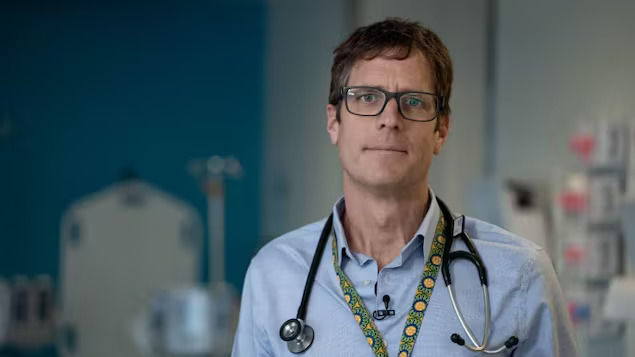Health
Is extending life by weeks worth the toll some cancer drugs take? Doctors push for ’common-sense oncology’

When a treatment buys a few weeks or months but comes with with a lot of side-effects, then the perspectives of people with cancer may differ, says Dr. Christopher Booth. PHOTO: (TURGUT YETER/CBC)
People may celebrate a 2-week improvement in survival without acknowledging costs
Tom Somerville’s decision stop medical treatment for his end-stage cancer was a personal one.
Somerville, 62, was diagnosed with colon cancer in 2021 that later spread to his liver. He had six months of chemotherapy to slow down the cancer, which he said also left him exhausted with nausea.
The Kingston, Ont., resident decided to take a break from treatment to enjoy a trip with his wife to Victoria.
Things that you cherish change, right?
Somerville said. I used to love being out in the bush, but now it is just nice to have a sunny day, sit with my family [and] have visitors.
Somerville said he came to terms with his prognosis and decided to enjoy the rest of the life he has left, extending the chemo break to a full stop. He said he was relieved to not feel crappy
from the treatment anymore.
Dr. Christopher Booth, Somerville’s medical oncologist at Kingston General Hospital, supports him in his decision.
Booth is also part of a group of cancer doctors in Canada and the U.S. who say medications with marginal benefits are overused for patients in the end stage of the disease. The oncologists have started a campaign through their website, journal articles and podcasts encouraging honest conversations about use of the drugs with cancer patients, their families and experts.
The goal of what they call common-sense oncology
is to prioritize treatments that meaningfully improve survival and quality of life. They aim to address what they see as problems in the field, such as a lack of critical thinking in oncology training, falling standards for drug approvals and avoidance of end-of-life discussions.
Balancing hope and reality
Booth said while there have been incredible advances in cancer treatments in his 20 years of practice, there’s also an unfortunate reality: cancer can’t always be cured. He strives to convey it in a compassionate and clear way.
Balancing … providing information but also providing hope, that’s the art of cancer care,
Booth said. Balancing hope and reality, balancing treatment and quality of life and side-effects, that’s the tough part of this job.
Booth said he thinks everyone would agree that a treatment that helps a patient live for extra months or years is very helpful. But when a treatment buys weeks with a lot of side-effects, then patient perspectives may differ.
In part that’s because the cancer drugs that can shrink tumours also come with side-effects, including fatigue, vomiting and hair loss.
Dr. Bishal Gyawali, a medical oncologist and associate professor at Queen’s University in Kingston, was motivated to press for changes when he noticed increased spending on treatments that don’t make much difference in patients’ lives while at the same time agencies didn’t put resources to what’s already been proven to work.
Gyawali previously treated people with cancer in Nepal, Japan, and the U.S. and saw the same trends there.
When attending oncology conferences, Gyawali said presenters would celebrate a two-week improvement in survival from a new treatment. Then, behind closed doors, other delegates would talk about the risks and costs of the drug.
People are saying is this really meaningful?
Gyawali (new window) aims to normalize asking such questions.
Quality of life and quantity
Rachel Koven’s husband, Ken Koven, was diagnosed in his late 40s with adenocarcinoma, which starts in gland cells of the esophagus tube. His cancer was found where the esophagus meets the stomach.
The father and avid runner treated having cancer like a battle, his wife said. He had nine months of palliative chemotherapy that’s given to relieve the symptoms of cancer and improve quality of life, but not meant to cure the malignancy.
The cancer spread. He then underwent radiation to the brain in Kingston, Ont. In 2016, about 16 months after the diagnosis, he died at age 49.
For my husband, his hope was anchored in treatment,
Koven said. However well-rounded the discussions we had, he would have always chosen treatment, and I can’t begrudge him for that because that is where he believed his strength was.
Now, Koven feels families should ask more questions of doctors, such as:
- How much time does this treatment offer?
- What are the real costs and benefits of the treatment?
Koven said not having treatment is sometimes seen as throwing in the towel, but that can be misleading.
Not having treatment isn’t giving up,
Koven said. Sometimes by having treatment you are giving up. You are giving up time with your family. You are giving up a quality of life necessarily for something you are not trading off any extra days.
Koven wrote an essay (new window) in 2018 on her experience as her husband’s caregiver in the Canadian Medical Association Journal. At the time, she was motivated to contribute to the best possible life in the face of death.
Now Koven advocates for the oncology field to recalibrate
toward an emphasis on what brings the person joy rather than only focusing on treating their cancer. Finding novel treatments that will really benefit patients is also important to her.
Seek meaningful answers
Dr. Elizabeth Eisenhauer ran more than 170 cancer drug trials in Canada, the U.S. and Europe. Now retired, Eisenhauer won the 2021 Canada Gairdner Wightman Award (new window) for investigating new cancer drugs and delivery approaches, including for Taxol, an anti-cancer treatment.
It’s a good thing we are having so much interest in finding novel therapeutics for cancer,
Eisenhauer said. But my goodness, let’s find the answers that matter to patients, too.
Eisenhauer recalled how in the 1980s, scientists set an arbitrary number as a standard, worldwide indicator of safe tumour shrinkage for early clinical trial research.
WATCH | Promise and limitations of AI to detect cancer:
STUDY SUGGESTS AI CAN HELP FIND BREAST CANCER
A new study suggests that artificial intelligence is showing major promise in detecting breast cancer, but researchers admit there are limitations. The technology can produce false positives — flagging too many mammograms as abnormal when there’s actually no cancer.
After that, measuring whether a tumour grew by 20 per cent on a CT scan, the definition of progression, became an endpoint, or goal, for pharmaceutical companies running randomized trials, Eisenhauer said. Randomized trials are meant to guide whether a drug should be used as a standard of care by physicians.
You have an answer sooner [using tumour shrinkage], but is it an answer that is meaningful?
she said.
Eisenhauer would like to see cancer clinical trials include more criteria.
I think common-sense oncology from my perspective as a trialist needs to come from the perspective of trying to be sure that the trials that we design at least can capture the information that will be of importance to those discussions with the patient sitting in front of you.
Eisenhauer said there aren’t a huge number of game changers in oncology (new window) every year, but many are available in Canada. She said costs to patients in terms of side-effects and time coming to the clinic also need to be considered.
Despite that, other Canadian researchers (new window) looking last year at use of treatments like chemotherapy or major surgery among more than 151,000 people who died found that a treatment was commonly given — in 41 per cent of cases — in the last 30 days of life but was potentially inappropriate.
So far, Gyawali said the common-sense oncology movement is gaining momentum worldwide and he’s received positive feedback from regulators, physicians, patients and payers.
WATCH | Why some cancer patients choose to pause treatment:
WHY STOPPING CANCER TREATMENT CAN BE ABOUT LIFE NOT DEATH
Many treatments for end-stage cancer are expensive, painful and do little to extend a patient’s life. CBC’s Christine Birak breaks down why a group of Canadian oncologists is adapting their approach and hears about why stopping treatment can be a chance to enjoy the life someone has left.
Tom and Katherine Somerville now take time every day to enjoy moments together, like walking down to the pond near their farmhouse, going for a drive on a sunny day or listening to old tunes.
For them, quality of life includes loving glances.
You appreciate that moment and you want to take it all in and those are the simple things that you realize are not so simple,
Katherine said. They’re the important things.
Amina Zafar (new window), Christine Birak (new window) · CBC News ·
This article is republished from RCI.





















